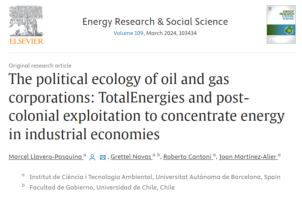
By Marcel Llavero-Pasquina, Grettel Navas, Roberto Cantoni, Joan Martínez-Alier
- Institut de Ciència i Tecnologia Ambiental, Universitat Autònoma de Barcelona, Spain
- Facultad de Gobierno, Universidad de Chile, Chile
Highlights
- TotalEnergies function is to extract and concentrate energy in industrial cores.
- Oil and gas facilitate asymmetric power relationships between periphery and core.
- Political access and technology determine the placement of new extraction frontiers.
- TotalEnergies and the French State intertwined agendas reproduce colonial injustices.
- Abandoning colonial and extractive State models should prevail over regulatory measures.
Abstract
Industrial economies require a steady supply of energy to reproduce and grow. Oil and gas companies fulfil that socio-economic function by constantly finding, extracting and transporting energy sources. The steady extraction and concentration of fossil resources in industrialised centres requires the constant expansion of extraction frontiers and the exploitation of the environment and local communities in unindustrialised areas. This leads to conflicts where local environmental justice organisations fight for the preservation of their lives, livelihood and culture, while companies defend their profits. Thus, oil companies become vectors of an oppression that links the societies enjoying the benefits of lavish energy with those that suffer the impacts of extraction. In this work, based on the Environmental Justice Atlas database, we systematically analyse 50 environmental conflicts related to one of such companies – the French oil major TotalEnergies. Our research reveals the social and environmental cost of the energy resources that power industrial economies. We find that, despite a recent narrative focused on the company’s ‘greening’, TotalEnergies’ extraction and concentration functions remain inextricably linked to fossil fuels. Furthermore, the interests and operations of TotalEnergies and the French State are inextricably intertwined and reproduce colonial relationships of power. Our findings support theories of change based on the abandonment of colonial and extractive State models, rather than pursuing fiscal and regulatory measures alone.
Read the full article here.

The project ENVJUSTICE has received funding from the European Research Council (ERC) under the European Union’s Horizon 2020 research and innovation programme (grant agreement No. 695446)